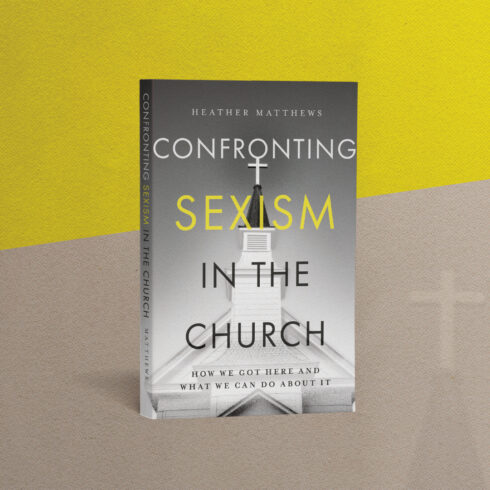Sexism in the Church Decreases Missional Effectiveness
Confronting Sexism in the Church, Pt. 3 of 3
*Note: In the previous two articles in this series, I’ve discussed (1) how sexism has greatly impacted women in the church and that (2) addressing sexism is a matter of biblical justice. In addition to these important issues, sexism also has a significant impact on the missional effectiveness of the church. ~HM
While many people like to consider the issue of women in leadership in the church simply as a theological disagreement, the church’s beliefs about and actions toward women have had broad and devastating impact on the church. Sexism makes the church less effective because it does not fully utilize the gifts of women in the church for the mission of the God in the world. Additionally, women outside the church do not see that the church welcomes them in their full humanity. They see the church as an organization with antiquated views of women. Women often find the church restrictive and repressive, fostering views about and roles for women that don’t align with their understanding of human dignity. Women are leaving the church or never entering its doors because they are accustomed to the respect, freedom, autonomy, and opportunities that they have in the workplace, in education, relationships, and other spaces outside the church
Women have been central to the growth, life, and mission of the church throughout history and throughout the world. Women have typically made up the majority of congregations and have been the majority of people serving both inside and outside the church. They are innovators and entrepreneurs of new ministries, caregivers of the least of these, theologians, leaders, and preachers. Women with extraordinary gifts have served the church and contributed to its mission in many ways, known and unknown, quietly and boldly.
Yet, the church in many places still stifles women’s voices and their gifts. When we prevent women from being their full selves and bringing their gifts into the church and into ministry, we are preventing the work of God through them for the benefit of the church and the whole world. Women throughout history have been told that their gifts are not allowed and are unwanted in the church. It is a tragedy that the church has repressed the gifts of so many women. Imagine a world without women like Junia, Paula, Amy Carmichael, Susanna Wesley, Teresa of Avila, Sojourner Truth, Phoebe Palmer, and the many other women who have had significant impact for the gospel in the church and in the world. There are many other real women in churches everywhere who have been silenced because of sexism. Women have been forced out of their leadership positions, unable to preach, harassed, discouraged from ministry, told to stay home, unpaid but overworked, and relegated to the sidelines.
Sexism makes the church less effective because it does not fully utilize the gifts of women in the church for the mission of the God in the world. (1/2) Share on X
Women are leaving the church or never entering its doors because they are accustomed to the respect, freedom, autonomy, and opportunities that they have in the workplace, in education, relationships, and other spaces. (2/2) Share on X
A pastor at a church where I attended for a while connected the parable of the talents in Matthew 25:14-30 with women’s gifts in the church. In this story, the master entrusts his servants with bags of gold, according to their abilities. Two of the servants multiplied their wealth, but one servant buried his “talents.” To the servants who multiplied their gold, the master said, “Well done,” but to the one who buried his treasure, he was angry and disappointed and took his gold from him. While this may not be the primary meaning of this passage, my pastor would often say, if the master was angry and disappointed at the man who buried his own talents, how much more would he be angry and disappointed if we bury the talents of women.
In Matthew 9:37-38, Jesus says, “The harvest is plentiful but the workers are few. Ask the Lord of the harvest, therefore, to send out workers into his harvest field.” Yet, the church has consistently prevented women from joining in the full range of work that Jesus called us all to do. Women are lost to the church and its mission throughout their lifetimes. Children growing up without female church leaders do not catch a vision of how God could use them in ministry. As women move through their education, they are less likely to be identified as leaders in the church, encouraged in their gifts, mentored by older leaders, and given opportunities to grow in leadership. Once women enter seminary and ministry it is much harder for them to find churches that will hire them and move into higher levels of responsibility and leadership. At each of these stages, women leave because it is too discouraging and difficult.
Women have been central to the growth, life, and mission of the church throughout history and throughout the world. They make up the majority of congregations and have been the majority of people serving the church. (1/2) Share on X
Women are innovators and entrepreneurs of new ministries, caregivers of the least of these, theologians, leaders, and preachers. They have contributed to its mission in many ways, known and unknown, quietly and boldly. (2/2) Share on X
Sexism is harmful not only for women, but also for men and children. It affects the discipleship of everyone in the church. When men do not see women in leadership, their view of women are impacted. Their ability to respect and mutually submit to women is hampered. Sexism in the church reinforces sexist beliefs and behaviors by men. When children grow up with up without women in leadership in the church, they also develop incorrect understandings about the roles of men and women. They lack a vision of women in leadership and fail to learn how men and women can partner together in the church.
The church is still lead predominantly by men, yet there are few men who are strong allies of women. Very few men show interest in understanding sexism, the impact of headship theology on women, and strategies for addressing sexism and empowering women in the church. The church will not change without men who are willing be strong allies and advocates for women.
It is time to address sexism in the church for the good of the church. This will be a defining issue for the church in the years to come. If the church fails to address sexism in the church, we will see more women leaving the church or never walking through the doors. But if the church and its leaders become allies for women, I believe we will see a significant positive impact for the church and its mission in this generation.
///
When we prevent women from being their full selves and bringing their gifts into the church and into ministry, we are preventing the work of God through them for the benefit of the church and the whole world. Share on X
*Editorial Note: If you’d like to read an excerpt of Heather’s new book, Confronting Sexism in the Church, the first chapter is available for download here: Naming the Problem (Ch. 1, Confronting Sexism in the Church) | Heather Matthews. ~CK





